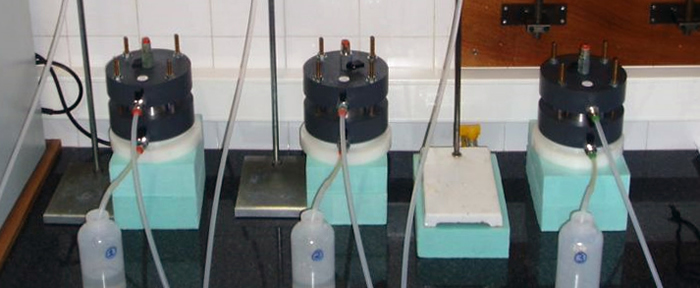The Geotechnical Waste and Contaminated Soils Laboratory (UGeoAmb) is integrated in the Geotechnics Department of LNEC.
UGeoAmb started its activity in 2004 with a view to provide support to studies and expert reports performed under contract, as well as the scientific and innovation research works in environmental geotechnics.
Additional information can be found at this laboratory's flyer.
Field of expertiseUGeoAmb develops laboratory and field characterization activities on: - waste, aiming to promote their recycling in geotechnical works;
- contaminated soils, supporting environmental assessment and remediation;
- fine-grained soils, considering their use, either natural or compacted, in environmental protection systems, and control of their application according to the Quality Assurance Plan.
TestingGeoAmb performs, among others, the following tests: - Measurement of pH, electrical conductivity and oxidation-reduction potential;
- evaluation of the quality of fines – blue methylene test;
- determination of organic matter content;
- determination of bulk and real densities, of porosity accessible to water and water absorption under vacuum conditions;
- determination of swelling potential (including steel slag);
- evaluation of durability – slakedurability test;
- determination of cement content in treated soils by soil mixing (deep, wet, and dry);
- evaluation of soil corrosion potential;
- permeability tests (laboratory/field);
- content determination of inorganic chemical elements by x-ray fluorescence – xrf (laboratory/field);
- evaluation of the release of dangerous substances from waste – batch leachate test, up-flow percolation test and lysimeter test;
- diffusion tests
Other servicesIn addition to the laboratory and field characterization works, to support studies and expert reports, UGeoAmb develops activity in other areas such as: - planned research studies and support to academic works;
- consultancy and support activities geoenvironmental site studies for engineering works, including planning and technical support of field survey;
- rehabilitation of environmental liabilities;
- assessment of soil contamination in the transaction of properties;
- management of contaminated sites;
- implementation of laboratory analysis methodologies;
- activities in support to the construction sector, through quality control performed during the work execution phase.
|





